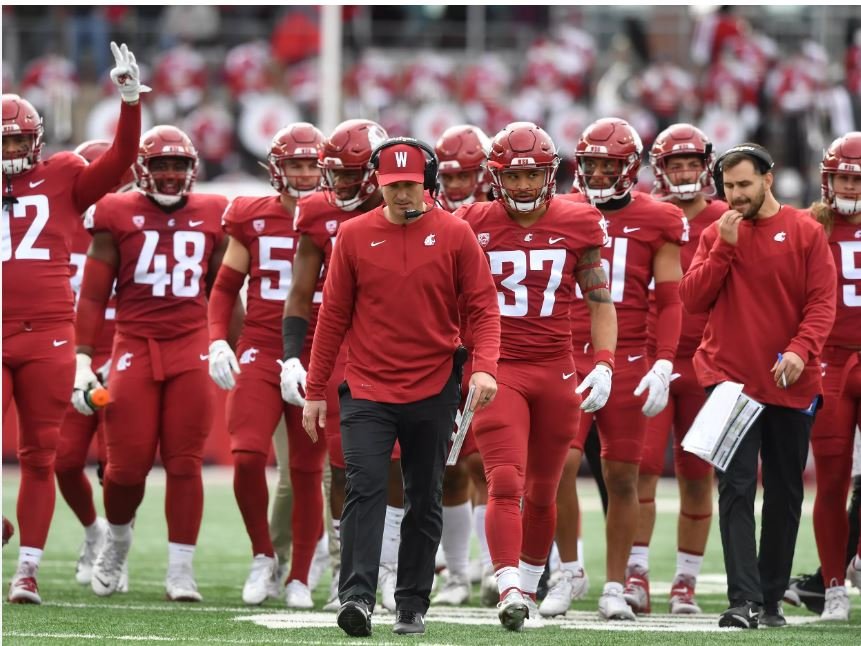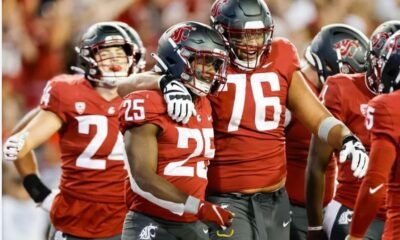NCAA
Washington State Cougars Football Under Investigation for Recruiting Violations During….more

The Washington State Cougars football program is currently under investigation by the NCAA for alleged recruiting violations that took place during the COVID-19 pandemic. This probe shines a spotlight on the intricate challenges and pressures faced by collegiate athletic programs amid unprecedented global health crises. To understand the implications and potential outcomes of this investigation, it’s important to delve into the specific allegations, the context of NCAA regulations during the pandemic, potential penalties for Washington State, and the broader impact on college football.
Allegations of Recruiting Violations
The investigation into Washington State’s football program centers on accusations that the team engaged in impermissible recruiting activities during the COVID-19 pandemic. Specifically, the allegations suggest:
- Improper In-Person Visits: Prospective student-athletes were reportedly brought to the campus for unofficial visits when the NCAA had prohibited such visits to reduce health risks. These visits allegedly included interactions with coaching staff, tours of the athletic facilities, and other benefits that could unfairly influence recruits.
- Use of Third-Party Recruiters: There are claims that third-party individuals, possibly boosters or agents, were involved in the recruitment process, offering incentives to potential recruits. This is strictly prohibited by the NCAA as it undermines the fairness of the recruiting process.
- Provision of Benefits: Allegations also include providing recruits with benefits such as travel expenses, accommodations, and possibly even monetary inducements, which are not allowed under NCAA rules.
NCAA Regulations During COVID-19
In response to the COVID-19 pandemic, the NCAA implemented a series of stringent measures to protect the health and safety of student-athletes, coaches, and staff. One of the key measures was the imposition of a “dead period” for recruiting activities. This dead period extended from March 2020 to June 2021 and prohibited in-person recruiting activities, including campus visits, in-person meetings, and off-campus evaluations.
The rationale behind these restrictions was to minimize travel and physical interactions to curb the spread of the virus. The dead period was a blanket rule applicable to all NCAA programs, ensuring a level playing field during the health crisis. Violations of these rules are considered serious infractions as they compromise both health protocols and the integrity of the recruiting process.
Potential Consequences for Washington State
If the allegations against Washington State are substantiated, the NCAA has a range of penalties it could impose, depending on the severity of the infractions and the level of cooperation from the university. Potential consequences include:
- Scholarship Reductions: The NCAA may reduce the number of scholarships that the football program can offer. This would hinder Washington State’s ability to attract and retain top talent, impacting its competitive edge in future seasons.
- Postseason Bans: In severe cases, the NCAA might impose a ban on postseason play, preventing the team from participating in bowl games or the College Football Playoff. This would not only impact the team’s visibility and revenue but also its attractiveness to recruits.
- Recruiting Restrictions: Additional recruiting restrictions could be enforced, such as limiting the number of permissible recruiting contacts, reducing the number of official visits allowed, or further extending the recruiting dead period specifically for Washington State.
- Fines and Financial Penalties: The program might face significant fines, which could strain the athletic department’s budget.
- Probation: The NCAA could place the program on probation, subjecting it to heightened scrutiny and additional compliance requirements for a specified period.
- Vacating Wins: In extreme cases, the NCAA might require Washington State to vacate wins from seasons in which ineligible players participated, affecting the historical record and legacy of the program.
The investigation into Washington State’s recruiting practices during the pandemic highlights broader issues within college football. The intense competition for top recruits often leads programs to push or even cross the boundaries of NCAA regulations. This case underscores the need for robust compliance mechanisms and a firm commitment to ethical standards in recruiting.
The potential fallout from this investigation could prompt other programs to reassess their own recruiting practices. Increased vigilance and stricter adherence to NCAA rules will be necessary to avoid similar issues. Furthermore, this situation might lead to calls for reform within the NCAA, including more transparent enforcement procedures and perhaps a reevaluation of recruiting guidelines to better suit extraordinary circumstances like a global pandemic.
At the heart of this investigation is the need for compliance and ethical conduct in collegiate athletics. The integrity of college sports depends on fair play and adherence to established rules. Institutions must balance the pursuit of athletic excellence with a steadfast commitment to ethical standards and regulatory compliance.
For Washington State, this investigation is an opportunity to reassess and strengthen its compliance practices. The program must demonstrate accountability and a commitment to reform if violations are confirmed. Transparency and cooperation with the NCAA will be crucial in navigating the fallout from this investigation and restoring trust in the program.
The ongoing investigation into the Washington State Cougars football program for alleged recruiting violations during the COVID-19 pandemic underscores the complex interplay between competitive pressures and regulatory compliance in college athletics. As the NCAA delves deeper into the allegations, the potential consequences for Washington State could reshape the program’s future and serve as a cautionary tale for other institutions. At its core, this situation reinforces the vital role of integrity and ethical conduct in maintaining the credibility and fairness of collegiate sports. As the investigation unfolds, the college football community will be watching closely, understanding that the outcomes will reverberate far beyond Pullman.
-

 NFL2 months ago
NFL2 months agoBREAKING: Steelers Best Quarterback Suspended for 6-Months Due to…
-

 NCAA1 month ago
NCAA1 month agoI am No Longer Comfortable at Illinois Fighting Illini, Quarterback Cal Swanson Cries Out…
-

 NFL2 months ago
NFL2 months agoJust In: Unexpected Name Surfaces in Rumors for Steelers Coaching Position.
-

 NFL2 months ago
NFL2 months agoRaheem Morris threaten to leave Atlanta Falcons if the Owners fails to….
-

 NFL2 months ago
NFL2 months agoGiants QB Daniel Jones to Undergo 12-Months Suspension After He was Found to be…
-

 NHL1 week ago
NHL1 week agoMinnesota Wild Veteran Player Announces Plan to Leave Team, Cites Poor Management…
-

 NBA2 months ago
NBA2 months agoBREAKING NEWS: LeBron James Has Agreed to Extend His Current Contract at Lakers worth $147.7 millions till…
-

 NHL2 months ago
NHL2 months agoHow should the Chicago Blackhawks handle their unsigned free agents for 2024–2025? Read to Find Out…..






